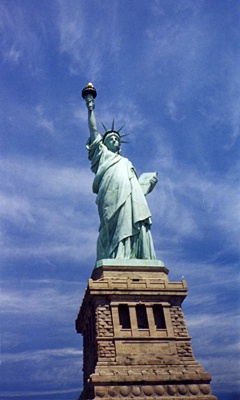All Nonfiction
- Bullying
- Books
- Academic
- Author Interviews
- Celebrity interviews
- College Articles
- College Essays
- Educator of the Year
- Heroes
- Interviews
- Memoir
- Personal Experience
- Sports
- Travel & Culture
All Opinions
- Bullying
- Current Events / Politics
- Discrimination
- Drugs / Alcohol / Smoking
- Entertainment / Celebrities
- Environment
- Love / Relationships
- Movies / Music / TV
- Pop Culture / Trends
- School / College
- Social Issues / Civics
- Spirituality / Religion
- Sports / Hobbies
All Hot Topics
- Bullying
- Community Service
- Environment
- Health
- Letters to the Editor
- Pride & Prejudice
- What Matters
- Back
Summer Guide
- Program Links
- Program Reviews
- Back
College Guide
- College Links
- College Reviews
- College Essays
- College Articles
- Back
Why the U.S. Should Accept Syrian Refugees MAG
In “The Phantom Menace,” Jedi Grand Master Yoda tells young Anakin Skywalker that “fear is the path to the dark side. Fear leads to anger, anger leads to hate, hate leads to suffering.” Although Yoda’s words were not enough to save Anakin from the grip of Palpatine, the little wizard makes a good point: fear can lead to many problems. Even though these words were uttered in a galaxy far, far, we should consider Master Yoda’s wisdom today when looking at the Syrian refugee crisis. After the Paris terrorist attacks, many U.S. governors announced in fear that their states would not allow Syrian refugees to settle there. However, the decision to live in fear and keep out refugees could lead to immense suffering, especially for the refugees. I believe the United States should allow more refugees to enter the country using the tough screening measures that we have in place. This process is less risky than most of us realize, and we have a moral obligation to help desperate people fleeing a war-torn nation.
Contrary to popular belief, there is a very rigorous screening process already in place for refugees entering the United States. First, potential refugees are screened by the United Nations High Commissioner for Refugees, or UNHCR, a process that includes reference checks and interviews. Then the UNHCR recommends refugees who have passed to the American government, which conducts its own screening process involving nine government agencies. Refugees have to face another round of interviews by U.S. officials. All in all, this process takes about two years before they are permitted to settle in the United States.
As a result of this screening, we have a very good idea of who we are letting into this country. And the numbers prove its effectiveness. Since the devastating September 11th attacks, the United States has resettled 784,000 refugees, and only three have been suspected of engaging in terrorist activities. Out of those three, two were not planning an attack in the United States, and the other suspect’s plans were barely credible. The risk of a terrorist attack by a refugee who undergoes the current screening process is almost nonexistent.
In fact, would-be terrorists have a much easier way to enter the United States: the visa waiver program. This program allows guests from 38 countries to spend up to 90 days here. The screening for these individuals is not nearly as rigorous as the refugee application process – 21.2 million entered the U.S. in 2013 alone. The European nationals suspected of committing the attacks in Paris would have been eligible for the visa waiver program, so if they had wanted to attack the U.S. would they have bothered with our long and rigorous refugee application?
While many Americans are living in fear of a hypothetical threat of an attack, Syrians have to deal with actual danger every day. The five-year-old Syrian Civil War is destroying their homes. ISIS is destroying their homes. President Bashar al-Assad is destroying their homes. These are real threats, unlike the fear of a hypothetical terrorist attack. Do we as a nation really want to tell thousands of desperate people – people who fear for their lives every single day – that we will not offer them asylum? Do we as a nation want to tell these refugees to go back and potentially die at the hands of ISIS?
This dire situation is sadly reminiscent of what happened to the Jews in the 1930s. In both cases, thousands suffered under a repressive government. In the 1930s, an overwhelming majority of Americans said that they opposed action to allow Jewish refugees to enter the United States. In fact, a boat of refugees that landed on American shores was sent back to Europe; many of those passengers were killed in the Holocaust. Do we really want to repeat that mistake? If we cannot understand the plight of the refugees and let them in, the message on the Statue of Liberty that says, “Give me your tired, your poor/Your huddled masses yearning to breathe free …” should really be removed.
Obviously, national security is a major concern. However, the refugee process is not compromising national security; the rigorous screening measures allow American officials to know who is entering the country. In addition, the visa waiver offers a much simpler way for would-be terrorists to enter the United States. What is getting compromised is the safety of the refugees. The refugees constantly fear for their lives in Syria, and they are risking life and limb to escape. President Franklin Delano Roosevelt famously proclaimed at his 1933 inaugural address that “the only thing we have to fear is fear itself.” We must remember those wise words at this crucial moment.

Similar Articles
JOIN THE DISCUSSION
This article has 2 comments.

210 articles 11 photos 50 comments